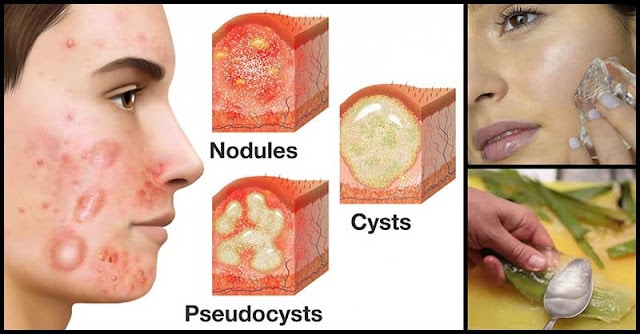Cystic acne is also called nodulocystic acne. It is common in people with oily skin and hormonal imbalances. As compared to milder forms of acne, cystic acne is noticeably painful as it is associated with large, stubborn, and inflamed cysts and nodules that appear on the skin and hangs around for days, weeks, or even months.
Some of its symptoms include:
- Breakouts that are painful to the touch or even when not touched
- Nodules that appear as raised, red bumps that generally do not have a whitehead showing
- Large, red and painful breakouts occurring on the face, back, chest, shoulder, upper arms, or thighs
- More visible acne that produces cysts and nodules in addition to papules and pustules
- Have lesions that can be felt beneath the skin before they’re seen
These symptoms increase psychological distress, decreases self-esteem and mood especially when cystic acne occurs on the face.
Natural Remedies For Cystic Acne
There are some natural treatments we can try at home to prevent cystic acne from worsening and to promote healing.
Put Some Ice On It
Cystic acne is associated with swelling, redness, pain, or even itchiness. Applying ice on it can provide some relief.
Rub an ice cube in a circular motion directly on top of the cystic acne spot. Continue doing this until it becomes too sensitive from cold. For best results, do these 3 times daily.
Make A Vinegar Cleanser
Jennifer Herrmann, MD, FAAD, explained that:
“DILUTED WHITE VINEGAR IS AN AMAZINGLY BROAD ANTIBACTERIAL THAT CAN HELP KILL THE ACNE BACTERIA.”
Make a vinegar cleanser by simply mixing a couple of capfuls of white vinegar in a cereal bowl of purified water. Use this mixture as a cleanser over the skin twice a day until desired results are achieved.
Check Your Diet
Making some changes to the types of foods you are consuming can have a huge effect on your cystic acne. Cut all forms of dairy from your diet for three weeks and see if any new breakouts appear. This includes milk, yogurt, cheeses, and many more. Also, avoid processed, sugary, and starchy foods as well as caffeine and chocolates as they only promote inflammation and leads to acne breakout.
Use Aloe Vera Gel
Aloe vera gel has antibacterial properties that can help kill acne-causing bacteria, and help lessen the associated redness that seems to follow acne around. Plus, it has astringent power that can pull dirt and other impurities (like oil) out of the skin, thus helping to avoid a breakout. It also cools and soothes the skin.
Fight Bacteria With Holy Basil
In a study published in the International Journal of Cosmetic Sciences, results demonstrated that holy basil and sweet basil can fight bacteria that cause acne. Drinking basil tea on a daily basis can help balance hormone naturally, thus fighting acne from the inside. It can also be added to homemade cleansers, and face masks.
Tap On Tea Tree Oil
This oil is often found in natural acne-targeting products. Due to its anti-inflammatory and antimicrobial properties, tea tree oil can help reduce inflammation and decrease the amounts of bacteria sitting on top of the skin. Lavender can also be used if tea tree oil is not available.
For this purpose, simply mix 4–8 drops of tea tree oil and one teaspoon of coconut oil or jojoba oil. Dap lightly onto the problem areas. It’s normal to feel a slight tingling, but if lots of burning is felt, discontinue its use. Since tree oil can be too harsh when applied directly to the skin, it is recommended to always use a carrier oil.
When treating acne with essential oils, it is recommended that one should avoid exposure to direct sunlight as it may only cause skin irritations or redness.
Your Towels and Pillowcases
Our towels and pillowcases touch our face daily. It would be better if we avoid washing these items with strong detergents and bleaches in order to lower chances of irritation and sensitivity. Opt for natural and unscented laundry products.
Also, frequent change of pillowcases and towels is recommended to avoid the presence and spread of bacteria which can only worsen acne.
A Word Of Advice
Always use natural and gentle remedies for the cysts to dissolve on their own. Avoid popping or touching them frequently to prevent infection. Before using certain products, ask for the advice of a dermatologist to avoid acne from worsening.
Disclaimer
The watching, interacting, and participation of any kind with anything on this page does not constitute or initiate a doctor-patient relationship with Dr. Farrah®. None of the statements here have been evaluated by the Food and Drug Administration (FDA). The products of Dr. Farrah® are not intended to diagnose, treat, cure, or prevent any disease. The information being provided should only be considered for education and entertainment purposes only. If you feel that anything you see or hear may be of value to you on this page or on any other medium of any kind associated with, showing, or quoting anything relating to Dr. Farrah® in any way at any time, you are encouraged to and agree to consult with a licensed healthcare professional in your area to discuss it. If you feel that you’re having a healthcare emergency, seek medical attention immediately. The views expressed here are simply either the views and opinions of Dr. Farrah® or others appearing and are protected under the first amendment.
Dr. Farrah® is a highly experienced Licensed Medical Doctor certified in evidence-based clinical nutrition, not some enthusiast, formulator, or medium promoting the wild and unrestrained use of nutrition products for health issues without clinical experience and scientific evidence of therapeutic benefit. Dr. Farrah® has personally and keenly studied everything she recommends, and more importantly, she’s closely observed the reactions and results in a clinical setting countless times over the course of her career involving the treatment of over 150,000 patients.
Dr. Farrah® promotes evidence-based natural approaches to health, which means integrating her individual scientific and clinical expertise


